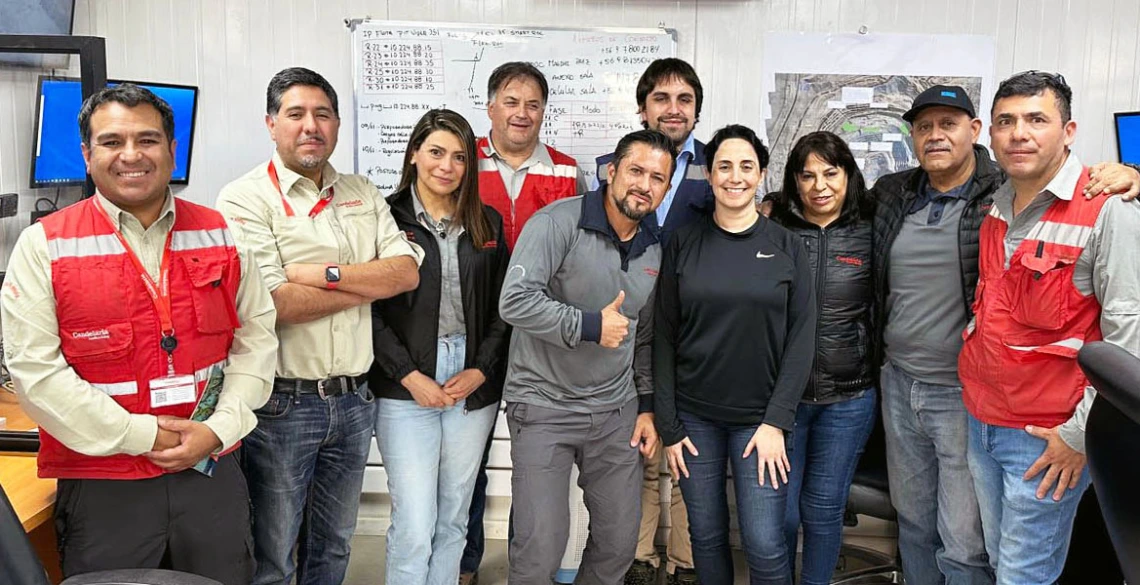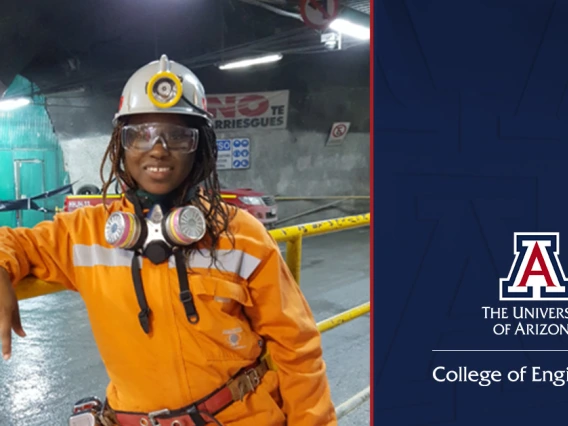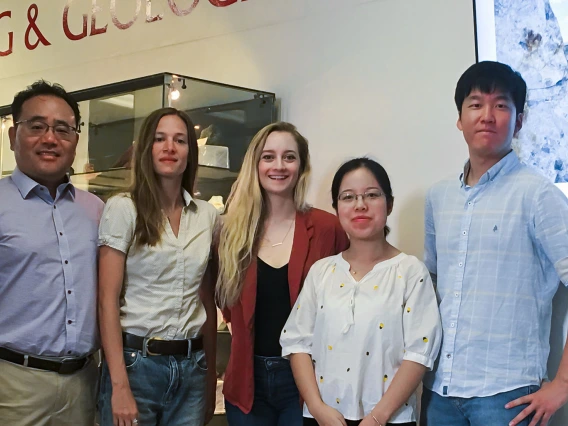SME Selects Risso for Recognition and Career Development
The MGE assistant professor improves mining safety with advanced technology.

Nathalie Risso, fourth from right, visited the Candelaria Mine in Chile during summer 2023. She is pictured with the mine's remote drilling operation team.
Nathalie Risso grew up yearning to make robots. As a native of Chile, she was also surrounded by mining. Now an assistant professor of mining and geological engineering
who uses her extensive electrical engineering knowledge to improve mining safety through autonomy, Risso has won the 2023 SME Career Development Grant.
The grant, awarded by the Society for Mining, Metallurgy, and Exploration and funded by Freeport-McMoRan, Inc., provides $300,000 over three years to support activities such as research, publication and professional service.
Risso joined the MGE faculty in 2021 after earning master’s and doctoral degrees in electrical and computer engineering from the University of Arizona. She graduated with a bachelor’s in electronics engineering from Universidad of Concepcion in Chile.
“Dr. Risso is an extraordinarily talented early career faculty member. As an electrical engineer, she brings a depth of knowledge around challenges in automation in mining. In addition, her experience in the Chilean mining industry provides her with a solution-focused perspective,” said Kray Luxbacher, the Gregory H. and Lisa S. Boyce Leadership Chair and MGE department head. “We deeply appreciate this investment in early career faculty by the SME and Freeport McMoRan, and I also see it as a sound investment in interdisciplinary research and cutting-edge mining education.”
Growing up, Risso was entranced by science fiction literature like Arthur C. Clarke’s “2001: A Space Odyssey” and the novels of Isaac Asimov.
“My father would read them to me before I went to sleep,” she recalled. “I just loved them, and my dream was to build robots and build artificial intelligence programs, so engineering was always there for me.”
Chile leads the world in copper production, and mining constituted about 15% of Chile’s gross domestic product in 2021, so Risso’s decision to devote her talents to mining engineering came naturally. Risso said as well that her particular research interests in automation and mining safety are directly related to the dramatic cave-in at the San Jose mines near Copiapó in Chile in 2010, where all 33 miners who were trapped more than 2,000 feet underground for 69 days were rescued.
Using autonomous systems in mining removes people from dangerous situations, she said.
“With remotely controlled equipment, the operator can be working in an office with the comforts of air conditioning and coffee nearby. It’s better for health and better for the environment.”
Two projects Risso is creating to reduce hazards to workers, which the grant funding will advance, use advanced technology and machine learning. One is a computer vision system that detects and ensures that miners are wearing the proper personal protection equipment for their environment. The other is a drone system that Risso is building incorporating algorithms that will investigate underground environments, for use in rescue operations.
“In an emergency in a mine, it will fly through and flag dangerous areas to identify the most effective path to get people out.”
Unregulated or irresponsibly managed extractive industries can damage the environment. At the same time, products like electric cars and renewable energy solutions such as wind and solar energy use proportionally more copper, lithium, graphite and other minerals than their fossil fuel counterparts. Rare earth elements are also used in smartphones, computer devices and pollution-reducing technology like catalytic converters.
“I seek to use technology to make this industry safer, more sustainable and profitable so it can continue. We have to fulfill the demand for these minerals in a way that is environmentally friendly and respects the nearby communities,” Risso said.
Risso will also use the grant funding to hire graduate researchers and to create educational media to show students and others how the mining field is transitioning, to help address the employment shortage in the industry.
“Mining has changed a lot, and it’s becoming very technological,” she said. “There are opportunities in this field where you can really make a contribution to society.”
Risso is the fourth university faculty member to receive the SME Career Development Grant since the program began in 2015. Angelina Anani was recognized with the award in 2022.



